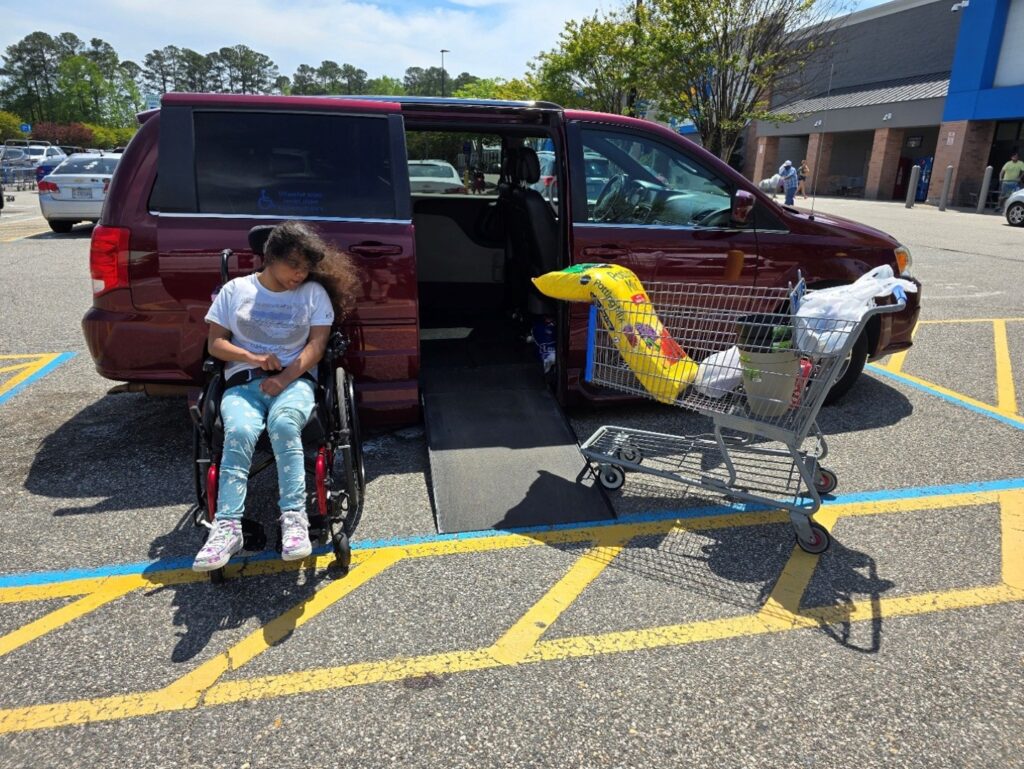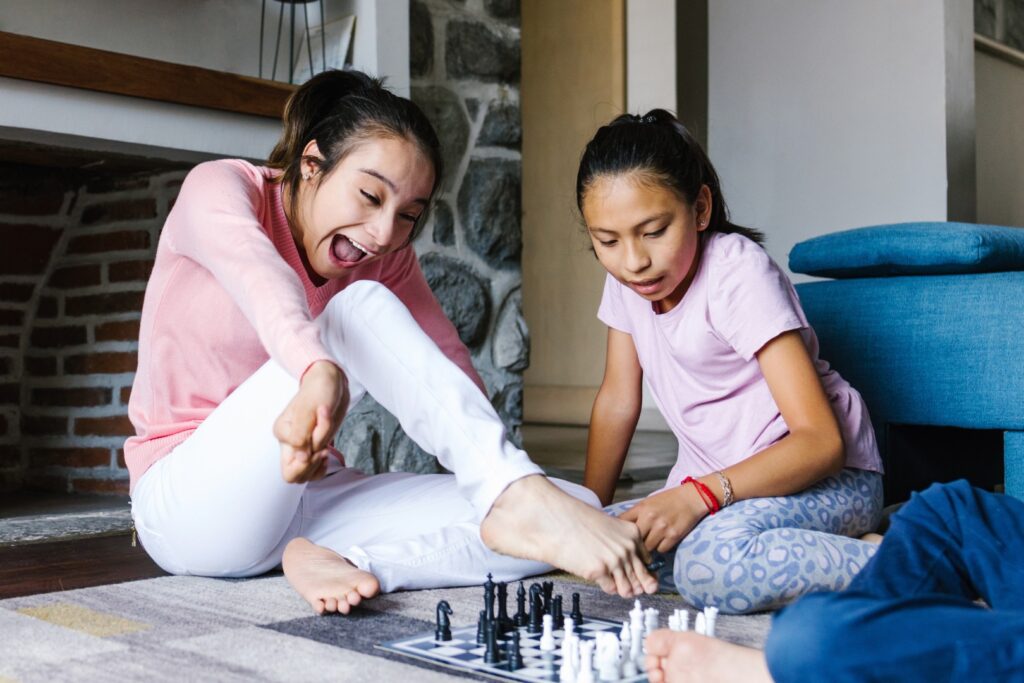

 by Mark Worrell, Army Senior Command Chaplain, ACBC Certified Biblical Counselor
by Mark Worrell, Army Senior Command Chaplain, ACBC Certified Biblical Counselor
During the reality show, Survivor 48, approximately 4.5 million people watched Joe console Eva when she became overwhelmed after a two-team challenge. At that time in their lives, Joe was a firefighter and Eva was a PhD student. Eva has high-functioning autism. Over 71,000 viewers have watched the clip on YouTube.
As a firefighter, Joe was compelled to care for Eva in her time of stress, but he broke tradition (or Survivor protocol) by asking host Jeff Probst if he could leave his team to comfort Eva, on the opposite team.
I'm blessed to be the dad of a special needs child. Scharleen is a fourteen-year-old girl with cerebral palsy. She depends on me and her mom for all her care, yet she loves life and interacting with others.
In May (2025), we attended Scharleen’s eighth grade dance. Unfortunately, only one child said a brief hi to her and then hurried on to hang out with her friends rather than waiting for Scharleen’s response. Other children tentatively pulled the chairs from the table where I was sitting with my wife, Shelly, as she fed our daughter. Our chairs were the only ones remaining.
Later, I received an email from a friend who wrote, "Next year, Scharleen will go to her dance with an entourage!"
 Most people don't notice our beautiful girl in her wheelchair, or they’re nervous and unsure about what questions they can or should ask. They’re uncertain how to engage with Scharleen, and with us about her. If they haven't yet heard her speak, such as her asking, "Hello, how are you?" or her responses when asked how she’s doing—"cool" or "good"—they don't realize she can talk and interact. Sadly, so many people miss out on her engaging personality and love for people.
Most people don't notice our beautiful girl in her wheelchair, or they’re nervous and unsure about what questions they can or should ask. They’re uncertain how to engage with Scharleen, and with us about her. If they haven't yet heard her speak, such as her asking, "Hello, how are you?" or her responses when asked how she’s doing—"cool" or "good"—they don't realize she can talk and interact. Sadly, so many people miss out on her engaging personality and love for people.
Scharleen regularly watches and listens to what's happening around her. She notices when she’s isolated or unable to do what others can. She'll answer yes and no questions, she’ll ask, "What are you doing?" and otherwise converse with those who take a moment to interact with her.
As you’re reading this, questions may be coming to your mind. Perhaps you’re wondering, What do special needs families struggle with? How can I help? Maybe you’re even asking, How can I make things easier for special needs families? I'm glad you’re asking these questions.
Before I respond, let me first define "special needs families." We are families impacted by one or more members with significant disabilities or struggles. The scenario may be parents who have a special needs child, a spouse with a debilitating medical issue, or even a family who is caring for an aging parent inside or outside the home. (I've learned much about caring for an aging parent since 2022.)
There are a few areas of struggle for special needs families. I'd say the most significant are connecting with "typical" families, taking care of the family’s basic needs when the special family member is with them, and parents having alone time together. There are others, but these cover many of the challenges.
 What do special needs families struggle with?
What do special needs families struggle with?
Typical families meet other families through their children. The kids meet and form friendships at school or while playing together in the neighborhood, and then the families get together. When a child can't get out to play or tell their parents who they spend time with at school, the parents don't get to connect with those who are close to their children.
As special needs children grow, the challenges of managing family necessities become more difficult. We can take care of a lot of our family needs (errands, appointments, etc.) while Scharleen is in school (7:15 a.m. to 3:15 p.m.). But when she’s with us and we need to shop, for example, the task is difficult from the onset (getting in and out of the car). Inside, I end up hitching Scharleen’s wheelchair to the shopping cart and we have a tractor-trailer appearance as we’re moving through the store. Don’t misunderstand; we love and value our time with our daughter. The point here is that special needs families have needs that are unique.
 Gaining parent alone-time together is also challenging. Special needs families can feel like their lives are centered around tasks—medical appointments, medicine times, and the complications of just getting the family out the door. Respite care has been very helpful to us. It provides special needs parents with essential alone time together without the regular impact of caring for the special needs family member. Our date night can become an errand night, which is discouraging.
Gaining parent alone-time together is also challenging. Special needs families can feel like their lives are centered around tasks—medical appointments, medicine times, and the complications of just getting the family out the door. Respite care has been very helpful to us. It provides special needs parents with essential alone time together without the regular impact of caring for the special needs family member. Our date night can become an errand night, which is discouraging.
Sometimes physical aches and pains result from lifting and moving a special needs child who can bear weight but has limited motor function. For example, Scharleen can stand on her feet, bearing her weight, but she cannot get herself into that position and cannot balance herself independently. We must get her into the standing position and then help her balance while walking. If she moves differently than expected, we can experience back, shoulder, or arm pain. We’re thankful for the many companies that make helpful equipment to assist in her care: lifts, bath chairs, wheelchair vans, etc.
How can I help?
The short answer is lean in. What do I mean? Let’s look at the story of the blind man (John 9). He had been blind from birth. The disciples and others were more concerned about what was spiritually wrong with him than how they could be a blessing to him. They asked, "Who sinned, this man or his parents, that he was born blind" (NIV)? Jesus leaned in to the blind man and the disciples to teach them God's purpose in special needs.
 He leaned in to the special needs man by intentionally seeking him out and then serving him by giving him sight—as only Christ could do. The healed man became a living object lesson for the religious leaders. The man exclaimed to them, "I was blind but now I see" (v. 25)!
He leaned in to the special needs man by intentionally seeking him out and then serving him by giving him sight—as only Christ could do. The healed man became a living object lesson for the religious leaders. The man exclaimed to them, "I was blind but now I see" (v. 25)!
His testimony continues today as one of the most well-known songs in the United States and known around the world: "Amazing Grace." Jesus used a physical need to address the man's spiritual need for a Savior.
How are you connecting with special needs families to help with their physical needs that will help them see who God is?
The disciples’ response to the man’s condition was a concern about the theology of suffering: "Why do bad things happen?" Jesus used that opportunity to point out that God displays His glory through people's challenges. While I believe His response refers explicitly to the blind man, whose testimony would be used throughout the ages from the Gospel of John, I also think His response applies to special needs people today.
Scharleen trusted Christ as her Savior in the spring of 2021 and has demonstrated God at work in her life. On Father's Day that year, I baptized her in the waters of Hickam Beach, Hawaii. I baptized her because she had confirmed she was a follower of Christ and believed that Jesus died for her sins, was buried, and rose again from the dead. She expresses joy to others; she connects with people who notice her; she loves life; and she reflects the glory of God through her joy. Though her life is hard, and she sees people who can walk, talk, interact, and do what they want, her joyful spirit ignites their joy and pulls laughter from them!
How can I make things easier for special needs families?
Again I'd say, lean in. Invite special needs families to do things with your family—meals, outings, vacations, etc. Know that there may be times during those activities when they must momentarily step away to care for their special needs family member. Helping with personal care isn't always easy. Find ways to be a blessing, and have your kids do the same.
Scharleen had a couple of close friends her age at two different duty stations. They loved Scharleen and enjoyed time with her. Helping the two friends realize they could be a blessing took a bit of nudging. But once they saw how they could help, they were all in! They would take her to youth group (elementary and junior high girls), run with her during some of the group’s games, and afterward bring her home to us.
Scharleen notices when she's left alone, but she can't pursue friendships on her own. A huge blessing would be for churches to host semi-inclusive youth camps—one that special needs young people could attend, along with their parents, to foster friendships.
Find ways to help special needs families. I'm learning to ask for help, as with tractor-trailer hitched shopping trips that can be challenging.
Make wheelchair spaces in your church seating areas and consider other ways to make church-attending easier for special needs families to care for special needs family members. Here are some considerations: Provide a space to change diapers on older children and adults and a space to accommodate other specific needs.
Shelly, Scharleen, and I have been blessed by the number of people willing to help and connect with us. I invite you to lean in to special needs families.
How are you demonstrating the gospel to special needs families? Consider bringing your communities’ special needs families into your church or military chapel. Here are a few more ideas to get you started:
Establish relationships! This may include volunteering with community groups who care for special needs families. Here are a few resources:
1) Moms in Motion
2) Joni and Friends
3) Help, Understanding, and Group Support (HUGS)
4) Department of Defense Exceptional Family Member Program (EFMP)
5) Look for special needs groups in your community
Consider how Matthew 25:37-40 looks in your life as Jesus discusses caring for "the least of these" (v. 40 NIV).
Connect with the Fallen Soldiers Ministries Biblical Counseling who will assist in connecting you with a counselor trained in the dynamics of a special needs family.
Look at opportunities to host a "Night to Shine" through the Tim Tebow Foundation: https://timtebowfoundation.org/host-night-to-shine/.
If you are interested in learning more about various special needs ministries, check out Joni and Friends at https://joniandfriends.org/product/start-with-hello/.
Mark Worrell is an Army chaplain serving as the senior command chaplain at Fort Eustis, VA, and the deputy joint base chaplain at Joint Base Langley-Eustis. Mark and his family have been in the Army since June 2008.
by Mark Worrell, Army Senior Command Chaplain, ACBC Certified Biblical Counselor
____________________________________
![]() Have comments or questions about this article - either directly for FSM or the author? Use our contact form to submit any input confidentially:
Have comments or questions about this article - either directly for FSM or the author? Use our contact form to submit any input confidentially:
____________________________________
If you are Veterans or a friend/family member of a Veteran and would like request our counseling, please use the link below:
If you are a counselor and would like to join our network, please use the link below:
Join the FSM Biblical Counselor Network
If you like what you've read , sign up to receive quarterly newsletter articles and updates via email - or SUPPORT our mission by making a donation, even $10 per month can make a huge difference and allow us to grow our counseling and spread the word of God!
Donate Now - One-Time or Recurring Monthly Donations!

If you are a Federal Employee and would like to donate FSM
is a certified Combined Federal Campaign (CFC) charity.
Designate ID #59846 / Fallen Soldiers Ministries.
_____________________________________________









